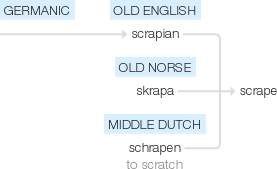Scrape
Old English scrapian ‘scratch with the fingernails’, of Germanic origin, reinforced in Middle English by Old Norse skrapa or Middle Dutch schrapen ‘to scratch’.
wiktionary
From Middle English scrapen, from Old Norse skrapa(“to scrape, scratch”) and Old English scrapian(“to scrape, scratch”), both from Proto-Germanic *skrapōną, *skrepaną(“to scrape, scratch”), from Proto-Indo-European *skreb-(“to engrave”). Cognate with Dutch schrapen(“to scrape”), schrappen(“to strike through; to cancel; to scrap”), schrabben(“to scratch”), German schrappen(“to scrape”), Danish skrabe(“to scrape”), Icelandic skrapa(“to scrape”), Walloon screper(“to scrape”), Latin scribō(“dig with a pen, draw, write”).
etymonline
scrape (v.)
early 13c., probably from Old Norse skrapa "to scrape, erase," from Proto-Germanic *skrapojan (source also of Old English scrapian "to scrape," Dutch schrapen, German schrappen), from PIE *skerb-, extension of root *sker- (1) "to cut." Meaning "gather by great effort, collect with difficulty" is from 1540s. Related: Scraped; scraping. To scrape the bottom of the barrel in figurative sense is from 1942, in reference to U.S. employers facing worker shortages during the war.
scrape (n.)
mid-15c., "a scraping instrument;" late 15c., "act of scraping or scratching," from scrape (v.). Meaning "a shave" is slang from 1859. Meaning "embarrassing or awkward predicament" is recorded from 1709, as OED suggests, "probably from the notion of being 'scraped' in going through a narrow passage."
